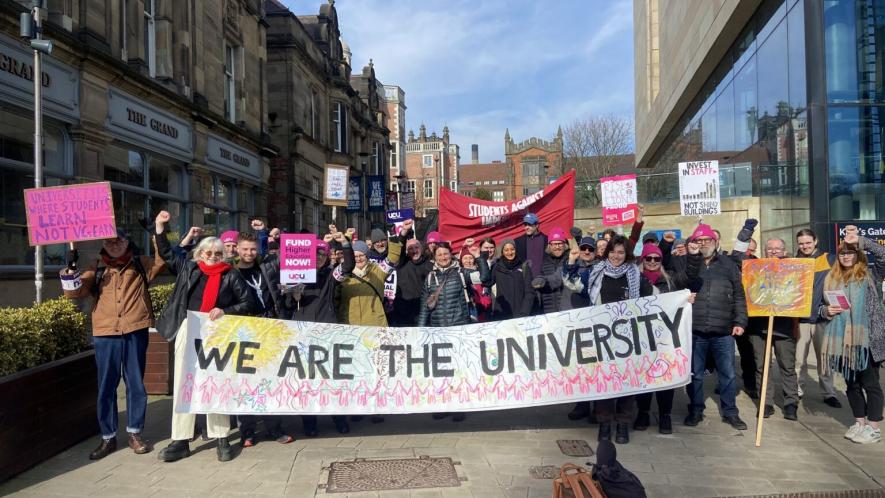UK: Newcastle University Strike Flags Crisis in Higher Education

Newcastle University staff during strike. Source: Ian McDonald/X
By the end of March, staff at Newcastle University will have completed 14 days of strike action in protest against management plans to achieve £35 million (USD 45.3 million) in savings and axe up to 300 jobs. The walkout comes despite record-high executive pay and the university’s pursuit of new international campuses, raising questions about leadership priorities.
Staff have reported high levels of stress and uncertainty as they await new details from university leadership on the proposed cuts next week. Their union, the University and College Union (UCU), continues to call for a radically different solution to protect jobs and access to education.
Impact on regional inequities
According to Matt Perry, representative of the local UCU branch, Newcastle’s proposed cuts mirror those faced by dozens of other universities across Britain – and will be felt particularly hard in the North East, where higher education participation already stalls behind other regions.
In an open letter to Education Secretary Bridget Phillipson earlier in the campaign, UCU warned that only 29% of 18-year-olds in the North East attend university, compared to around 50% in London. “Regions such as the North East need their universities,” the union appealed. But no support has come from education authorities or Phillipson, whose own constituency is located nearby. This makes her silence especially frustrating, Perry told Peoples Dispatch. “It’s essential for her [and the Department for Education] to intervene and regenerate the region,” he added.
A sector-wide crisis
Newcastle is not the only university facing this scenario. UCU branches in Sheffield and Durham, among others, have either pursued or prepared for industrial action over the past weeks. The growing wave of union protests reflects a wider crisis in British higher education, which has been driven by the sector’s increasing commercialization and reliance on market logic. “We need urgent government intervention to salvage our universities, combining major public investment with wholesale reform to restore our institutions of higher learning in service of the public good,” UCU General Secretary Jo Grady wrote earlier this month.
Yet the Labour government has been heavily criticized for “sitting on its hands” when it comes to higher education. UCU estimates that as many as 10,000 jobs across the sector could be at risk, with around 80% of institutions facing deficits in 2026-2027, driven by failed strategies – including a fixation on high tuition-paying international students. At the same time, Keir Starmer’s cabinet announced major investments into armament plans and proposed cuts to welfare programs.
Even as universities fail to meet their international recruitment targets, there is little indication the strategy will change. Meanwhile, student debt has reached devastating levels: around two million people in Britain owe more than £50,000 (USD 65,000) each in student loans. The implications extend beyond education, affecting housing security and overall quality of life.
Redefining the idea of higher education
While university management often frames cuts as necessary cost-saving measures, that rationale appears shaky. This is true for Newcastle University as well. According to financial data obtained by the Newcastle UCU branch, the university is not facing any immediate liquidity crisis. In other words, as Perry explains, not a single redundancy is financially necessary at this time.
Instead, staff are worried that the cuts may be laying the groundwork for broader restructuring, including program closures. If this goes ahead at Newcastle, they say, there’s every reason to believe the same playbook will be used elsewhere. As a result, their strike is not only about saving hundreds of jobs, but also about reimagining the role of the university and countering a failed vision of market-driven higher education.
Courtesy: Peoples Dispatch
Get the latest reports & analysis with people's perspective on Protests, movements & deep analytical videos, discussions of the current affairs in your Telegram app. Subscribe to NewsClick's Telegram channel & get Real-Time updates on stories, as they get published on our website.
























